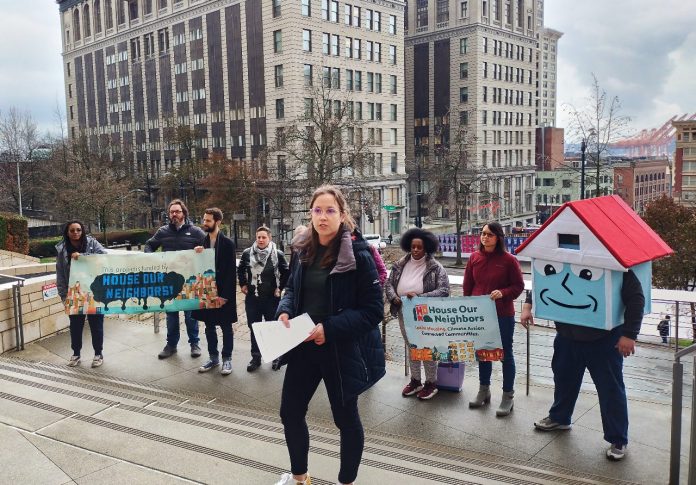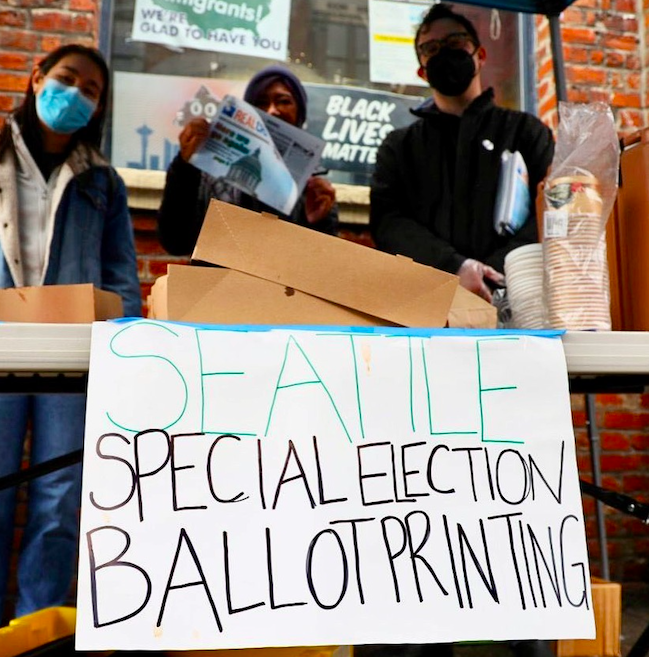
After winning at the polls to create a social housing authority, House Our Neighbors is seeking to take the next step and fund it with a Seattle millionaires tax.
If a ballot initiative filed Tuesday with the city clerk’s office is successful, Seattle voters this fall will be able to weigh in on the question of whether Seattle should tax high-income earners to create a dedicated funding stream to build and create mixed-income social housing. Last spring, the advocacy group House Our Neighbors ran Initiative 135, which created a new Public Development Authority (PDA) within city government to build, maintain, and operate a new kind of publicly subsidized housing after Seattle voters approved it. The group is hoping to get back on the ballot to create a dedicated funding stream for that housing.
Effectively a millionaires tax, Initiative 136 would tax employee compensation in excess of $1,000,000 at a 5% rate just on the portion over that million-dollar threshold, with stocks and bonuses included. House Our Neighbors estimates instituting such a tax in Seattle would generate a little over $50 million per year, with a small share set aside to pay for the City’s finance department to administer the tax. Unlike the City’s existing JumpStart payroll tax, grocery stores and health care companies would not be exempt.
The 180-day period that organizers have to collect signatures starts as soon as the city clerk certifies the initiative. Initiative rules stipulate that supporters will need to gather at least 26,521 verified signatures of registered voters in order to secure a place on the ballot. House Our Neighbors is hoping to get on this November’s general election ballot, a ballot that looks to already be crowded with a citywide transportation levy, a potential countywide climate levy, and statewide initiatives that look to repeal several of the state legislature’s signature achievements from the past few years. In 2023, 57% of Seattle voters approved I-135 via a relatively low-turnout February special election.

Social housing, which is common in places like Singapore and Vienna, is a model for long-term affordable housing in which households across the income spectrum share a building, with wealthier tenants paying higher rents, which partially subsidizes the tenants paying lower rents. Advocates hope that the model can be deployed at scale in Seattle, paving the way for a rebound in middle class residents a city needs in order to be able to thrive — teachers, nurses, artists, baristas, bus drivers — to be able to live in the city’s increasingly expensive neighborhoods for the long haul. Spots in buildings would be open to households making up to 120% of the area median income, or around $120,000 for a family of two.
“If we’re honest with ourselves, and if lawmakers were honest with us, there is no level of government that has a plan to address our housing crisis at scale,” Tiffani McCoy, policy and advocacy director of House Our Neighbors, said at a press conference Tuesday following the initiative’s filing. “There isn’t a plan from the private sector. And the affordable housing sector is constrained by what the Housing and Urban Development (HUD) department decides year-to-year.”
McCoy said the social housing developer will be focused on delivering two- and three-bedroom units, something that isn’t commonly produced in Seattle’s current rental market.
A sample business plan, created by affordable workforce housing developer Ben Maritz, outlines how the income stream could be utilized to build 2,000 new units of housing over a 10-year period, for a variety of household sizes and income ranges. That plan assumes the developer will be able to secure bank loans at current interest rates, but does not assume that the City will issue any bonds against the new revenue source, which is one way that the funding could potentially be used to get new units online faster. (Full disclosure: Ben Maritz is a boardmember at The Urbanist, but has no input into editorial decisions at the publication.)

“We know that social housing should be funded, and it should flourish in Seattle,” said Sharon Lee, executive director of the Low Income Housing Institute, a leading affordable housing provider in the region. “I will say that as a nonprofit housing developer, we spend so much time trying to find pieces of property, having to wait a year, or two years, for financing [and] another year for permits. And it just takes too long. And partly, it’s because why do we have to wait two years for financing? It’s because we don’t have a ready source of financing.”
“If we support and fund social housing now, we are creating a more inclusive and broader pathway for housing,” Karen Estevenin, executive director of PROTEC17, the union representing the largest single segment of City of Seattle employees, said Tuesday. “We are supporting working people like city workers, our neighbors and each other, we are supporting our communities.”
Polling conducted last year found that social housing was popular with Seattle voters; 65% supported adding mixed-income mid-rise apartment buildings in their neighborhoods, which was stronger support than market-rate multiplexes received in the poll. “The poll provides strong support for an all-of-the-above approach to adding housing all across Seattle, with the interesting twist that social housing developments appear to make larger buildings more popular than they’d otherwise be,” The Urbanist wrote last June.
While providing the potential to deliver on the promise of social housing that voters supported at the polls, the initiative campaign is already drawing criticism from business groups opposed to the structure of the tax, starting with the Seattle Metropolitan Chamber of Commerce.
“[T]his tax proposal hits a familiar refrain: tax first, plan later, and hope for results,” Chamber president and CEO Rachel Smith said in a statement released just hours after the initiative was filed. “And we’ve got a lot of questions: what systems are in place for purchasing and managing existing units? How does that add to housing inventory? What’s the financing plan? We’ve seen no concrete proposals — or much of anything — from the Social Housing Public Development Authority Board.”
Ultimately, the initiative wouldn’t tie the hands of the PDA’s board to a specific business plan, with House Our Neighbors remaining a completely separate entity. Decisions on how exactly to utilize funding would be made by the board in consultation with its new CEO, a position that the board is currently working to fill. But to create social housing in the city, a funding source will be needed.
Meanwhile, Mayor Bruce Harrell and a closely allied city council appear poised to make budget cuts and dip into JumpStart payroll tax revenues — which were originally designed to fund affordable housing — to fill a looming budget deficit projected to stretch for years.
If House Our Neighbors gets their way, it will be the city’s voters who will be the ones to decide whether they’re on board with greater investment in housing rather than entering an era of austerity and budgetary belt-tightening.
Editor’s note: Those interested in the signature gathering or otherwise supporting the campaign should reach out to House Our Neighbors.
Ryan Packer has been writing for The Urbanist since 2015, and currently reports full-time as Contributing Editor. Their beats are transportation, land use, public space, traffic safety, and obscure community meetings. Packer has also reported for other regional outlets including BikePortland, Seattle Met, and PubliCola. They live in the Capitol Hill neighborhood of Seattle.

